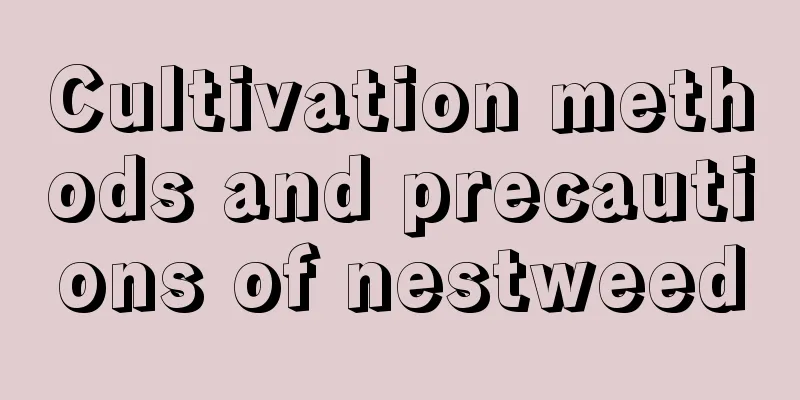Cultivation methods and precautions of nestweed

1. Maintenance methods1. Temperature: Nestia is relatively cold-resistant and will grow as long as the temperature is above zero degrees. When the temperature for sowing is around ten degrees, the seedlings will emerge and grow. They are not resistant to high temperatures. If the temperature exceeds thirty degrees, the plants will grow slowly. 2. Watering: It likes a humid living environment and the soil should be kept moist for a long time. The plant consumes a lot of water during the branching and green pod stages, so it needs to be supplemented with water. If the soil remains dry for a long time, the plant will grow poorly. It needs to be watered once every week. 3. Fertilization: During the growth process, it consumes phosphorus quickly, so the plant is prone to having more nitrogen and less phosphorus. During this period, it is necessary to use phosphorus fertilizer to ensure the balance of nitrogen and phosphorus, which can also promote future yields. The frequency of fertilization is once a month. 4. Light: It cannot accept strong light exposure, which will affect its growth. Therefore, the lighting method should be mainly diffuse light, and the lighting time should be guaranteed to be four hours a day. 2. Breeding techniques1. Reproduction: It can be propagated by sowing. First, you need to mix base fertilizer into the soil. Generally, 1,500 kilograms of organic fertilizer is used per acre of land. Sow the selected seeds into the soil using the row sowing method, with a row spacing of 30 cm to ensure moisture retention. Cover them with soil after sowing and water them with manure. Generally, seedlings will emerge in a week. 2. Weeding: Weeds often grow in places where it is grown. In order to avoid weeds competing with plants for nutrients, weeding should be done regularly. When weeding, be careful not to spray pesticides on the nest vegetable. 3. Problem Diagnosis1. Pests: The plants are easily infected by pests such as caterpillars and blind bugs. If found, use pesticides to spray and kill the insects. 2. Disease: After the plants emerge, they should be sprayed with carbendazim frequently to enhance their disease resistance. It is susceptible to powdery mildew and leaf spot. If infected, the diseased seedlings should be pulled out and destroyed as soon as possible to avoid further infection, and then the plants should be sprayed with pesticides for prevention and control. IV. Other issues1. Edibility: It cannot be eaten, but it can be used as medicine. 2. Toxicity: It is poisonous during the flowering period, so avoid contact with its juice during the maintenance process. Wear gloves and masks when operating. If you accidentally come into contact with the juice, you need to wash it with clean water and then seek medical attention as soon as possible. |
<<: Pepper cultivation methods and precautions
>>: Cultivation methods and precautions of ground vegetables
Recommend
How to repot the peace lily tree
Steps to repotting the peace lily First of all, t...
Phalaenopsis's efficacy and effects
Decorative effect Phalaenopsis has a unique flowe...
Is Osmanthus fragrans a plant that likes shade or sunlight?
Does Osmanthus fragrans prefer shade or sun? Osma...
Methods and precautions for cutting propagation of trumpet creeper
How to reproduce trumpet creeper Trumpet creeper ...
When does the lotus flower bloom?
1. Flowering period The flowering period of bowl ...
How to plant ginger in pots after it sprouts
1. Cut into small pieces Cut the sprouted ginger ...
Time and method for planting autumn lettuce seedlings
Autumn lettuce planting time Autumn lettuce is us...
How to make the fairy finger bloom on New Year's Day
1. Flowering period of Immortal Finger The fairy ...
Can Quisqualis be eaten raw?
Can Quisqualis be eaten raw? Can be eaten raw. Qu...
Time and method of pollination of four-season fruit
Pollination method of four seasons fruit Self-pol...
What can you keep at home to attract peach blossoms?
1. Raise peach blossoms Peach blossom, peach blos...
Which flowers are suitable for cake fertilizer (what kind of cake fertilizer is used for flowers)
First of all, I can tell you clearly that most of...
How to prune old branches of potted green radish
1. Methods If you find old and dead branches on t...
Centipede breeding technology
Centipede is an arthropod , also known as centipe...
How to care for gold diamonds in winter
Is gold diamond afraid of cold? The golden diamon...









